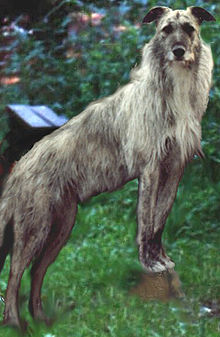Lurcher
| Lurcher | ||
|---|---|---|
|
|
||
| Not from the FCI recognized | ||
| Origin : | ||
| List of domestic dogs | ||
The Lurcher is a hybrid dog from Great Britain and Ireland. He is not a dog breed in the strict sense, but a crossbreed of two or more dog breeds with the participation of greyhounds .
Origin and history
The Lurcher was formerly the traveling people in the British Isles for poaching bred. The word Lurcher originally comes from Anglo- Norman and was adopted into Middle English in the 16th century ; to lurch here means "to lurk" or " sneak around".
Lurchers are created by crossing greyhounds , usually greyhounds or whippets , with shepherd dogs such as collies or large terriers . The name Lurcher applies in breeding only to dogs that are derived from crosses between a greyhound and a non-greyhound. Crosses between two different breeds of greyhound are called a longdog .
The Lurcher is a form of dog bred for a specific area of activity, i.e. for function. A standard pure breed, as it is practiced in pedigree dog breeding , does not occur with the Lurcher: It is assumed that suitable dog breeds are crossed again and again. If the crossbreeding products prove to be suitable for hunting, they will also be used for further breeding. For these reasons, Lurchers do not have a uniform appearance. In the meantime, however, attempts are being made to establish a uniform breed standard. For this purpose, a specific "type" is used for breeding.
description
The Lurcher is a greyhound-like hybrid dog with short, half-long or stick-haired or smoothly lying fur in all colors and ears protruding to the side that can also be set up.
use
The Lurcher is a dumb, high-legged dog with good family dog characteristics . Lurcher also be used to hare coursing ( Hare coursing used), where two Lurcher a highly made in the field rabbit chase.
Web links
- The Lurcher Submission - Lurcher materials from the UK Association of Lurcher Clubs
- Ria Hört: The Lurcher . In: The Canine Chronicle . No. 234 , 2008 ( online: (1) , (2) (PDF; 5.0 MB)).

